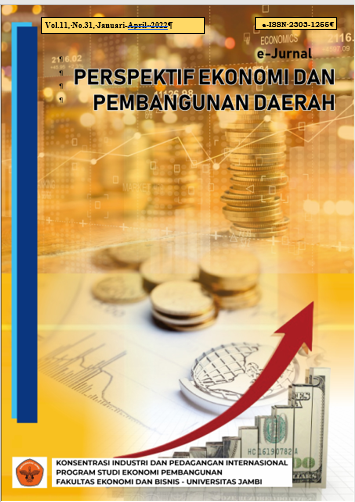Analisis kausalitas pertumbuhan ekonomi terhadap ketimpangan distribusi pendapatan di Indonesia (1999-2019) Granger Causality
DOI:
https://doi.org/10.22437/pdpd.v11i1.13831Keywords:
Economic growth, GDP, inequality in income distribution, Gini ratio causality grangerAbstract
The theory of economic growth states that an increase in economic growth will increase per capita income, decrease inequality in income distribution, and will have an impact on reducing the number of poor people, but an increase in economic growth also has an impact on an increase in the poor population, and an increase in income distribution inequality. So that the purpose of this study is to analyze the causality of economic growth and inequality of income distribution in Indonesia. The data that will be used in this research is secondary data which is time series from 1998-2019 obtained from the World Bank and the Central Bureau of Statistics. The analysis model used is the Granger Causality Test analysis. The variables that will be used in this research are GDP Indonesian at constant prices and the Gini ratio. Based on the results of this study, the development of Indonesia's gross domestic product based on the results of the Granger causality tends to affect the Gini Rato variable longer than the other way around.
Â
Downloads
References
Anggiat Mugabe Damanik, Zulgani, R. (2018). Faktor-faktor yang mempengaruhi ketimpangan pendapatan melalui pertumbuhan ekonomi di Provinsi Jambi. E- Jurnal Perspektif Ekonomi dan Pembangunan Daerah, 7(1), 15–25.
Arsyad, Lincolin. (2010). Ekonomi pembangunan. Unit Penerbit & Percetakan STIM YKPN Yogyakarta: Yogyakarta
Fahmi, Irham. (2018). Pengantar perekonomian indonesia: teori, konsep dan realitas. Alfabeta: Bandung.
Jihene, Boulila. (2013). The causality between income inequality and economic growth : emprical evidence from the Middle East and North Africa Region. Asian Economic and Financial Review, 3(5):668-682.
Jones and Vollrath. (2013). Introduction to economic growth (third edition). W.W.Norton Company, Inc.
Khairul, Amri. (2017). Analisis pertumbuhan ekonomi dan ketimpangan pendapatan : panel data 8 provinsi di Sumatera, Jurnal ekonomi dan Manajemen Tenologi 1(1), 6-10
Kuncoro, Mudrajat. (2003). Ekonomi pembangunan: teori, masalah, dan kebijakan. UPP AMD YKPN: Yogyakarta
Kuncoro, H. (2008). Konvergensi pendapatan regional Kota dan Kabupaten di Indonesia. Ekonomi Regional, 3(1), 11–22.
Kuznet, S. (1955). Economic growth and income inequality, American Economic Review, 45 (1): 1-28
Nafziger, Wayne, E. (1997). The economics of developing countries, Prentice-Hall, New Jersey: New York
Mankiw, N. Gregory. (2010). Macroeconomics (seventh edition). Worth Publisher.
Sbaouelgi, J., & Boulila., G. (2013). The causality between income inequality and economic growth: empirical evidence from the Middle East and North Africa Region. Asian Economic and Financial Review, 3(5), 668–682.
Sukirno, Sadono. (2006). Ekonomi pembangunan: proses, masalah dan dasar kebijakan. Jakarta; Kencana,2006
Tambunan, Tulus. (2001). Perekonomian indonesia:teori dan temuan empiris. Ghalia Indonesia: Jakarta
Todaro, Michael. (2003). Ekonomi pembangunan di dunia ketiga. Erlangga: Jakarta
Todaro,Michael. (2006). Pembangunan ekonomi jilid I. Erlangga, Jakarta
Todaro, Michael. (2011). Pembangunan ekonomi jilid II. Erlangga, Jakarta
Waluyo, J.(2004).Hubungan antara tingkat kesenjangan pendapatan dengan pertumbuhan ekonomi: suatu studi lintas negara. Jurnal Ekonomi Pembangunan. 9(1), 1-20.
Widarjono, Agus. (2013). Ekonometrika pengantar dan aplikasinya. UPP STIM YKPN: Yogyakarta
World Bank. (2020). Indonesian gini ratio. diakses dalam www. https://data.worldbank.org/, pada Tanggal 09 Januari 2021, Pukul 19.35
Downloads
Published
How to Cite
Issue
Section
License
Copyright (c) 2022 Rizky Enggar Wishartama, Zulgani Zulgani, Rosmeli Rosmeli

This work is licensed under a Creative Commons Attribution 4.0 International License.





